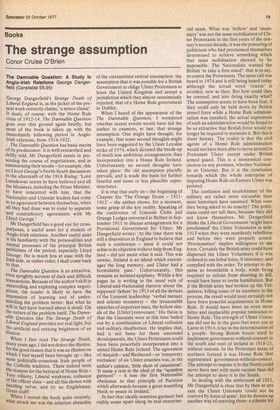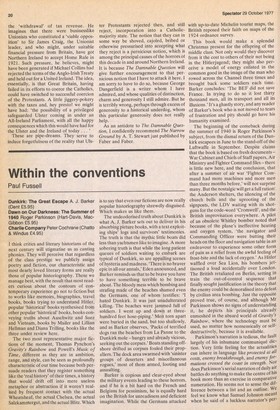Books
The strange assumption
Conor Cruise O'Brien
The Damnable Question: A Study in Anglo-Irish Relations George Dangerfield (Constable £6.95) George Dangerfield's Strange Death of Liberal England is, as the jacket of the present work correctly claims, 'a minor classic'. It deals, of course, with the Home Rule crisis of 1912-14. The Damnable Question goes over that ground again 'briefly, but most of the book is taken up, with the immediately following period in AngloIrish relations, from 1914-1922.
The Damnable Question has basic merits of its predecessor: it is well-researched and deftly told. Mr Dangerfield excels in presenting the course of negotiations, and in summarising their results — for example, this on Lloyd George's North-South discussions in the aftermath of the 1916 Rising: 'Lord Lansdowne seems to have believed and all the Ministers, including the Prime Minister, to have concurred with him, that the Nationalist and Unionist leaders had come to an agreement between themselves, when all they had done was to come to separate and contradictory agreements with Mr Lloyd George.' Mr Dangerfield has a good eye for crosspurposes, a useful asset for a student of Anglo-Irish relations. Another useful asset is his familiarity with the personalities and mental processes of the principal British Politicians of the period, especially Lloyd George. He is much less at ease with the Irish side, or rather sides; I shall come back to that.
The Daninable Question is an attractive, even sprightly account of dark and difficult transactions. Because of the author's skill in unravelling and exploring complex negotiations, the reader is likely to have the impression of learning and of understanding the problem better. But what he will in fact have learned about is detail. On the nature of the problem itself, The Damnable Question like The Strange Death of Liberal England provides not real light, but the artificial and enticing brightness of an illusion.
When I first read The Strange Death, many years ago, I did not detect the illusion, for the good reason that it was an illusion on Which I had myself been brought up — like most politically-conscious Irish people of the Catholic tradition. There indeed were the reasons for the betrayal of Home Rule — Tory villainy, Liberal weakness, collusion of the officer class — and all this shown with dazzling verve, and by an Englishman. Great stuff!
When I reread the book quite recently, What struck me was the inherent absurdity of the unexamined central assumption: the assumption that it was possible for a British Government to oblige Ulster Protestants to leave the United Kingdom and accept a jurisdiction which they almost unanimously rejected, that of a Home Rule government in Dublin.
When I heard of the appearance of the The Damnable Question, I wondered whether recent events would have lid the author to examine, at last, that strange assumption. One might have thought, for example, that some second thoughts might have been suggested by the Ulster Loyalist strike of 1974, which dictated the break-up of much less ambitious arrangements than incorporation into a Home Rule Ireland. Unfortunately no second thoughts have taken place: the old assumption placidly prevail, and is made the basis for further fanciful and more or less plausible superstructures.
It is true that early on — the beginning of Chapter Six 'The Orange Drum — 19111912' — the author shows, for a moment, some grasp of the key reality. Speaking of the conference of Unionist Clubs and Orange Lodges convened in Belfast in September 1911 to discuss arrangements for a Provisional Government for Ulster, Mr Dangerfield writes: 'At the time there was still a disposition in England to believe that such a conference — since it could not achieve its objective without help from England — did not mean what it said. This was unwise. Ireland is an island which encourages the long memory, and Ulster had a formidable past.' Unfortunately, this remains an isolated epiphany. Within a few pages he is writing in the usual vein of Liberal-and-Nationalist rhetoric about the supposed 'failure' by 1913 of all the devices of the Unionist leadership: 'verbal menace and solemn mummery — the treasonable speeches of important men, the hollow rituals of the [Ulster] convenant.' His thesis is that the Unionists were at this time bailed out by a combination of Liberal collusion and military disaffection. He implies that, had it not been for these untoward developments, the Ulster Protestants could have been peacefully incorporated into a united Home Rule Ireland. The agreement of Asquith — and' Redmond — to 'temporary exclusion' of six Ulster counties was, in the author's opinion, 'little short of calamitous': 'It made a rent in the ideal of the "seamless garment" — it was the first Nationalist obeisance to that principle of Partition which afterwards became a great stumbling block to peace in Ireland.' In fact that ideally seamless garment had visibly come apart along its real centuries old seam. What was 'hollow' and 'mummery' was not the mass mobilisation of Ulster Protestants in the first years of the century's second decade; it was the posturing of politicians who had proclaimed themselves determined to achieve something which that mass mobilisation showed to be impossible. The Nationalists wanted the British 'to take a firm stand': that is to say, to coerce the Protestants. The same call was heard in 1974 and is still being heard today although the actual word 'coerce' is avoided, now as then. But how could they be coerced, and into doing exactly what? The assumption seems to have been that, if they could only be held down by British armed force while a Home Rule administration was installed, the actual experience of such an administration would be found to be so attractive that British force would no longer be required to maintain it. But this is sheer fantasy. The reality is that the civil agents of a Home Rule administration would not have been able to move around in Protestant Ulster except under British armed guard. This is a nonsensical conclusion on any premises, whether Nationalist or Unionist. But it is the conclusion towards which the whole enterprise of imposing Home Rule on Eastern Ulster was pointed.
The confusion and recalcitrance of the military are rather more excusable than most historians have assumed. What were they being asked to do exactly? The politicians could not tell then, because they did not know themselves. Mr Dangerfield thinks the Liberal Government 'might have proclaimed' the Ulster Volunteers in mid1913 when they were manifestly rebellious and before they were properly armed. 'Proclamation' implies willingness to use force. Certainly the British army could have dispersed the Ulster Volunteers if it was ordered to use lethal force, if necessary, and complied with the order. To attempt to disperse so formidable a body, while being required to refrain from shooting to kill, would have been to invite humiliation. But if the British army had broken up the Volunteers, killing some of its members in the process, the result would most certainly not have been peaceful acquiescence in Home Rule. It would have been an even more bitter and implacable popular resistance to Home Rule. The strength of Ulster Unionism did not lie in the guns that were run at Lame in 1914; it lay in the determination of a people. Strong British forces' tried to implement government-without-consent in the south and west of Ireland in 1918-21, without success, In the Protestant areas of northern Ireland it was Home Rule that represented government-without-consent. The attempt to impose it in the North could never have met with more success than did the attempt to deny it in the South.
In dealing with the settlement of 1921, Mr Dangerfield is clear that by then at any rate the Ulster Unionists 'could not be coerced by force of arms', but he dreams up another way of coercing them: a scheme for the 'withdrawal' of tax revenue. He imagines that there were businesslike Unionists who constituted a 'viable opposition' to Sir James Craig, the Unionist leader, and who might, under suitable financial pressure from Britain, have got Northern Ireland to accept Home Rule in 1921. Such pressure, he believes, might have been generated if Michael Collins had rejected the terms of the Anglo-Irish Treaty and held out for a United Ireland. The idea, essentially, is that Great Britain, having failed in its efforts to coerce the Catholics, could have switched to successful coercion of the Protestants. A little jiggery-pokery with the taxes and, hey presto! we might have had: 'the possibility of a privileged safeguarded Ulster coming in under an All-Ireland Parliament, with all the happy consequences which this would have had for the Ulster and the Ireland of today . These are pipe-dreams. They serve to induce forgetfulness of the reality that Uls ter Protestants rejected then, and still reject, incorporation into a Catholicmajority state. The notion that they can in some way be shoved, cajoled, bribed or otherwise pressurised into accepting what they reject is a pernicious notion, which is among the principal causes of the horrors of this decade in and around Northern Ireland. It is because The Damnable Question will give further encouragement to that pernicious notion that I have to attack it here. I am sorry to have to do so, because George Dangerfield is a writer whom I have admired, and whose qualities of distinction, charm and generosity I still admire. But he is terribly wrong, perhaps through excess of generosity to a historical underdog, whom this particular generosity does not really help.
As an antidote to The Damnable Question, I confidently recommend The Narrow Ground by A. T. Stewart just published by Faber and Faber.



































 Previous page
Previous page